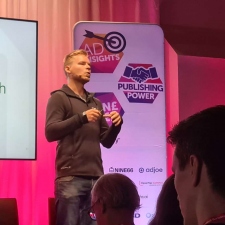Pocket Gamer Connects Helsinki 2023 is on now and we’ll be bringing you coverage from our event as it happens.
One key aspect of any PGC event is the talks and tracks, with individual talks by some of the game industry’s brightest and best divided into individual tracks by topic.
CPO and co-founder of Metaplay Teemu Haila offered his insights in a talk entitled “Three top learnings from shipping modern F2P games”.
Don’t just build for the now
“The game development process is all about tradeoffs. My talk focuses on some of the most impactful ones I’ve seen during my 15 years’ experience making games,” explains Haila.
“As game developers, we’re often faced with the question: what am I sacrificing later if I choose to build this now? In an industry that moves so fast - with near-immediate feedback from players and the market - the option to build for the now often prevails. It becomes all-to-easy for developers to make decisions that only consider the short-term, and long-term planning can seriously suffer as a result.
“Fast forward a couple of years and as a result of this short-term thinking, developers often find they have a project on their hands that despite being played by millions of players, can be flaky at its foundations. It becomes a challenge to build anything on top of and the thought of continued scaling - more features, more players, more growth - can send shudders down spines.
“The core premise is perhaps as important as any one particular thing: that planning for the long-term doesn’t mean you have to sacrifice building for the short-term.
“A concrete example of this is that developers should consider building the foundational pipelines for easy game economy management and configuration that will allow them to update their game over-the-air, without having to make new builds. “Building a Google Sheet and plugging it into your game’s backend is a great way to do this and even better if your backend has version control and rollback capabilities.”
“With good planning, this can extend to other crucial areas too - savvy devs can schedule events, run A/B tests, and optimise IAP bundles all from the same Google Sheet, without having to touch the server and without having to get anywhere near an app store.“
Hope is hopeless
“Hope is not a plan”, Haila explains, is his favorite quote and retort to what he’s heard from some developers saying “We have a lot of problems and we have a lot of money to solve the problems. Figuring it out now is literally - if you do the math - 100x cheaper than trying to fix it later.”
Haila was candid about how vital it is that developers take this advice on board. And while he talked within the specific area of coding and iteration, his lessons were just as applicable to virtually any area of game development. “By considering the long-term requirements of their game when they first start building it, they will be able to plan an upgrade path and create the solid foundations they need in order to more easily build on top of it later.
“As a result, game developers will get a much easier ride, and can create much better games. Hopefully you can better anticipate the roadblocks that you’ll more than likely face at one point or another, and will appreciate these concrete solutions.”
Three takeaways
Haila offered three key takeaways from the talk. “First, consider now, implement later, make it easy for yourself to progressively adopt complex workflows later. Second, customise your data pipeline”, Haila noted that by putting in the work now you improve your ROI workflow both now, and five years down the line. Then, finally, plan your upgrade paths and “use tools with well defined migration options to massively reduce maintenance costs over time.”
As Haila noted, these are all achievable, and although they’re not at all easy to implement they are very feasible for virtually any team at scale. “It’s all about applying the thinking that’s needed to make games in a way that’s more efficient, productive, and scalable in the long-term. I hope the three actionable takeaways in this regard help developers to ship better games, and be even more proud of their work.”
Want to join us at Pocket Gamer Connects Jordan 2023?
Couldn't make it to Helsinki? Don't worry, Pocket Gamer Connects returns later this year in Jordan, November 4 - 5 2023. Don't miss it!
Find out more about the event and get your tickets here!





















